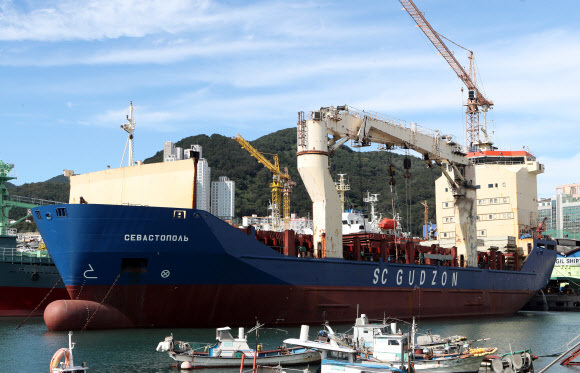 |
|
The Russian ship Sevastopol, owned by the company Gudzon, docked at the port of Busan after its departure was suspended due to suspicions of UN sanction violations. (Yonhap News)
|
No credible evidence found connecting the Sevastopol to illegal shipments of North Korean coal
On Oct. 2, the South Korean government allowed a Russian ship that is under US sanctions on North Korea to leave port after initially suspending its departure. The government explained that it had given the ship, which docked at the port of Busan in mid-August, permission to leave because its investigation into whether the ship had violated sanctions against North Korea had not turned up any credible charges. “The government had suspended the Sevastopol’s departure from the port on Sept. 28 in order to investigate charges connected with sanctions on North Korea. The procedure in question was completed on Oct. 2, and consequently, the government lifted the departure suspension imposed on the vessel,” South Korea’s Ministry of Foreign Affairs said in a press release on Tuesday evening. The Sevastopol reportedly entered the port of Busan for repairs on Aug. 13 and then delayed its departure for unrelated reasons. A week after its arrival, on Aug. 21, the US named the ship in its sanctions, which prompted Seoul to carry out a related investigation. But it was not until Sept. 28 that the government announced it would be necessary to suspend the ship’s departure. The US Treasury Department didn’t make any specific allegations about North Korean sanctions violations by the Sevastopol when it added the vessel to its North Korea sanctions. The Treasury Department did specify that a Russian-flagged vessel called the Patriot had supplied oil to North Korea through ship-to-ship transfers on two occasions in early 2018. According to the Treasury Department, the Patriot supplied 1,500 tons of oil to a North Korean ship called the Chong Rim 2 and 2,000 tons to another North Korean ship called the Chon Ma San. The ultimate purchaser of the oil was the Taesong Bank, which is under both UN and US sanctions. Both the Chong Rim 2 and the Chon Ma San are also subject to sanctions by the UN Security Council. Identifying Russian shipping companies Primorye Maritime Logistics and Gudzon Shipping as the owners of the Patriot, the Treasure Department slapped sanctions on the two companies as well as the Patriot and five other ships linked to Gudzon. There’s no evidence that the Sevastopol directly violated sanctions against North Korea. “The suspension on departure differed from the impounding step that is taken for ships that are found to have committed illegal activity, such as violating UN Security Council sanctions. In our search and investigation, we were unable to confirm any violations of UN Security Council resolutions,” the Foreign Ministry said on Tuesday. On Oct. 1, Russia summoned South Korean ambassador to Russia Woo Yoon-keun to lodge a complaint and ask that the “impounding” of the Sevastopol be lifted. Gudzon has consistently claimed that it’s unconnected with the Patriot and that it hasn’t violated sanctions against North Korea. By Kim Ji-eun, staff reporter Please direct comments or questions to [english@hani.co.kr]






